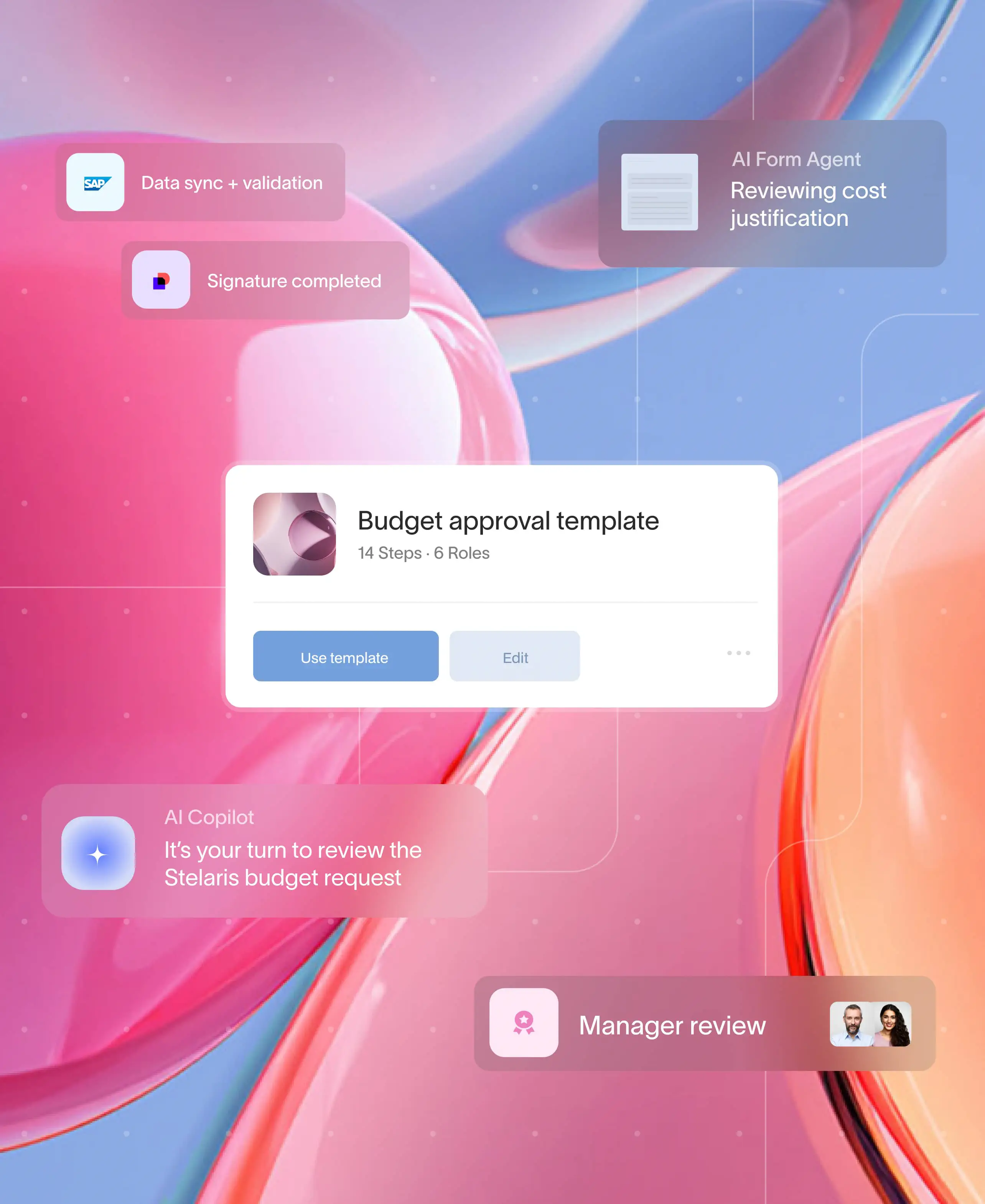
At a glance
Contract playbooks turn legal expertise into structured, repeatable processes that prevent negotiation inconsistencies.
Clause libraries standardize language, speeding up drafting and reducing contractual risk.
Fallback clauses and approval gates maintain flexibility while enforcing compliance and control.
Moxo operationalizes playbooks with automated workflows, built-in controls, and AI assistance to scale best practices across teams.
Why contract playbooks matter
Contracts sit at the heart of every business relationship. They define obligations, risks, and value capture. Playbooks address this by standardizing negotiation strategies. Instead of every contract becoming a fresh legal project, playbooks enable repeatable, predictable outcomes.
In financial services, playbooks ensure every NDA, MSA, or client agreement complies with regulatory requirements.
In consulting, playbooks keep SOW negotiations within scope and protect profitability.
In law firms, playbooks guide junior lawyers, reducing the burden on senior partners.
In healthcare, playbooks enforce HIPAA-compliant data protection clauses across patient contracts and vendor agreements.
The key business outcome: contracts close faster, risk is contained, and legal bandwidth is freed for complex issues instead of repetitive reviews.
What a good playbook contains
Strong playbooks combine legal rigor with operational usability. They serve as both a reference and a workflow enabler.
Elements in detail
Standard clauses: Every recurring issue, confidentiality, liability, IP rights, and dispute resolution should have pre-approved language. This avoids reinventing the wheel and ensures compliance with regulatory frameworks like GDPR and SOC 2 (Moxo security).
Fallback clauses: Alternatives pre-approved by legal to give negotiators flexibility without creating risk. Fallbacks accelerate deals by providing options when counterparties push back.
Approval gates: Clear thresholds for escalation. Example: liability above $1M routes to the general counsel; data processing outside GDPR-compliant jurisdictions routes to compliance.
Negotiation commentary: Business-friendly explanations of why certain clauses matter, so sales or procurement teams understand the rationale and don’t concede too quickly.
Risk thresholds: Hard boundaries for issues like indemnity or data storage, preventing overexposure.
Ownership: Defined roles for who approves what. This ensures accountability.
Example: A vendor contract may standardize liability at contract value, fallback to insurance coverage, and escalate any unlimited liability demands to the CFO and general counsel. This avoids unacceptable risk while still giving negotiators a path forward.
The business outcome: contracts are more predictable, negotiation cycles shorten, and fewer deals require escalation.
Clause library and fallbacks
A clause library is more than a repository; it is the foundation for consistency. It ensures that every contract, across departments and geographies, uses aligned, risk-approved terms.
Clause categories in depth
Confidentiality: NDAs with consistent duration (e.g., two years) and data handling rules.
Liability: Caps tied to contract value or insurance; exclusions for indirect damages.
Intellectual property: Rules for ownership of deliverables, licensing, and usage rights.
Termination: Notice periods, termination-for-cause language, and force majeure.
Data protection: GDPR-compliant terms, HIPAA clauses in healthcare, SOC 2 alignment in financial services.
Payment terms: Net 30 as standard, fallback to net 45, escalation if beyond 60.
Why fallbacks matter
Fallback clauses give negotiators confidence. Instead of pausing for legal input every time a counterparty resists, they can move to a pre-approved alternative.
Example: In a consulting SOW, the standard scope clause may state “deliverables as listed in Appendix A.” A fallback allows for “deliverables aligned with milestones defined in project plan,” ensuring flexibility without exposing the firm to unlimited work.
Business outcome: deals move faster, client relationships are smoother, and legal teams avoid constant low-value escalations.
Approval gates and deviations
Approval gates create guardrails. They ensure that when negotiators step outside the playbook, leadership visibility kicks in.
Types of approval gates
Value-based: Any contract above $1M routed to executive review.
Risk-based: If liability caps are removed, escalation is required.
Regulatory-based: Data transfers outside GDPR or HIPAA-compliant zones trigger compliance checks.
Operational-based: Any clause deviating from SLA standards escalates to operations.
How deviations are managed
In Moxo, deviations trigger automated workflows:
- Non-standard clause flagged.
- Auto-routing to designated approver (e.g., compliance, general counsel).
- Decision logged in audit trails.
- Workflow either continues or escalates further.
Example: A law firm required partner approval if liability exceeded $1M. Moxo enforced this automatically, no emails or manual follow-ups, ensuring control without slowing routine deals.
Business outcomes: risk is managed proactively, leadership gains visibility into high-stakes contracts, and deviations are tracked for continuous improvement.
Enforce playbooks in Moxo
The real challenge with playbooks is execution. Many organizations build them, but they remain PDFs or training guides that negotiators ignore.
How Moxo operationalizes playbooks
- Workflow automation: Playbook rules embedded into no-code workflows. (Workflows)
- AI support agent: Reviews contracts in real time, flags deviations, suggests fallback clauses, and explains risks in plain language.
- Role-based access: Ensures only authorized individuals approve deviations.
- Audit trails: Every clause change, fallback use, and approval is logged.
- Secure portals: Counterparties negotiate through branded client portals, ensuring transparency.
Case-style examples
- A financial services firm used Moxo to enforce liability playbooks. Deviations were flagged instantly, reducing negotiation cycles by 40%.
- A consulting firm cut email back-and-forth by 75% by embedding SOW playbooks in workflows.
- A healthcare provider ensured HIPAA clauses were never bypassed—every exception was routed to compliance automatically.
- A logistics company embedded vendor compliance clauses, ensuring every supplier contract passed safety reviews before execution.
Business outcome: Playbooks are no longer shelfware. They actively guide negotiations, enforce compliance, and reduce legal overhead.
Transforming legal guidelines into actionable workflows with structured templates
A structured template helps teams translate legal guidelines into enforceable workflows.
Moxo allows these templates to be digitized. Once embedded into workflows, they trigger automated actions, control approvals, and provide full compliance visibility.
How Moxo helps
Contracts don’t just need storage—they need coordination, visibility, and compliance across every stage of review and approval. Moxo bridges the gap between traditional contract management tools and full workflow orchestration by bringing automation, collaboration, and control into one platform.
Build dynamic approval workflows
With Moxo’s no-code workflow builder, teams can create multi-step contract workflows that include intake, review, and e-signature stages. Each action, such as document submission, approval, or revision, is tracked and auditable, eliminating email back-and-forth.
Integrate with your existing systems
Moxo connects seamlessly to CRMs, ERPs, and contract management systems, ensuring all approvals, data, and signed agreements stay synchronized. Teams can trigger contract creation or send signed copies back into existing repositories automatically.
Collaborate securely across parties
Unlike internal-only CLM tools, Moxo provides secure client-facing portals where external stakeholders such as vendors, clients, or partners can review, comment, and approve contracts via magic links without needing separate accounts.
Automate compliance and visibility
With workflow automation, Moxo enforces business rules like approval thresholds, SLA timers, and escalation paths. Performance dashboards track cycle times, bottlenecks, and contract turnaround, while audit trails maintain accountability across every revision.
Ensure security and governance
All activity runs within Moxo’s enterprise-grade security framework, including SOC 2, GDPR, SSO, and encryption controls—helping legal and compliance teams manage contracts with full oversight.
With Moxo, organizations move beyond static CLM systems to orchestrated contract workflows that align internal reviewers and external signers in one auditable, automated environment.
Embed playbooks in your workflow
Contract playbooks and clause libraries give organizations a powerful way to standardize negotiations, reduce risk, and accelerate deals. But their value is limited unless enforced. Moxo embeds these playbooks into workflows, ensuring consistency, compliance, and client confidence at scale.
Book a demo with Moxo to see how playbooks can transform your contracting process.
FAQs
What is a contract playbook?
It is a guide that defines standard clauses, fallback positions, and escalation paths. Moxo enforces them through workflows and AI.
What is a clause library?
A curated collection of pre-approved clauses. Moxo ensures these are applied consistently across contracts.
How do fallback clauses speed negotiations?
They provide flexibility without creating risk. Moxo’s AI suggests them automatically during reviews.
How do approval gates reduce contract risk?
They ensure deviations escalate to the right person. Moxo enforces this with workflows and audit trails.
Can Moxo replace a CLM system?
No. Moxo complements CLMs, focusing on orchestration and enforcement, while CLMs handle drafting.






